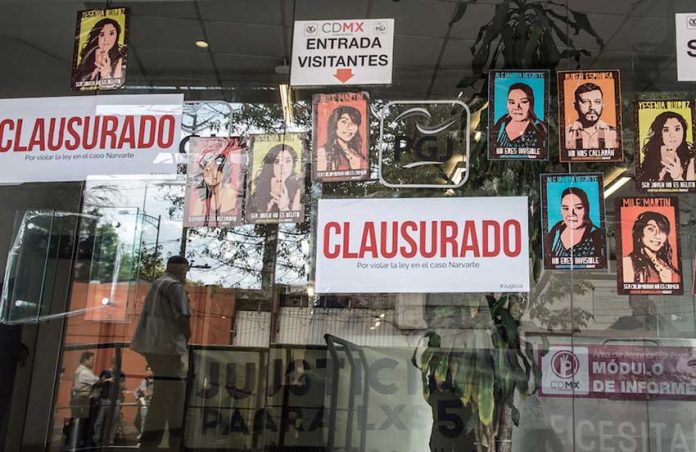Three years after five people were murdered in the Mexico City neighborhood of Narvarte, authorities remain reluctant to effectively investigate the case and are obstructing measures aimed at establishing the motive and finding out what really happened.
That was the contention put forward by lawyers, victims’ family members and activists yesterday at a press conference, where they also charged that the same authorities have failed to act on recommendations issued by the Mexico City Human Rights Commission (CDH).
Nor have they issued a public apology for their flawed investigation as ordered.
On July 31, 2015, four women — 31-year-old Colombian national Mile Virginia Martin, 18-year-old student and make-up artist Yessenia Quiroz Alfaro, 32-year-old human rights activist Nadia Dominique Vera Pérez and 40-year-old domestic worker Olivia Alejandra Negrete Avilés — and one man, 31-year-old photojournalist Rubén Espinosa Becerril, were killed execution style in an apartment in the middle-class neighborhood.
Leopoldo Maldonado, a lawyer for the human rights organization Article 19, said yesterday the so-called Narvarte case is still “an open wound that continues to fester due to the lack of will of authorities to advance in [establishing] the truth, [serving] justice and [securing] the reparation of damage.”
Three people have been arrested in connection with the case but only one has been sentenced and all of them have alleged that they were tortured while detained.
The two men not yet sentenced have been granted injunctions ordering that the criminal process against them be restarted due to the human rights violations to which they were subjected, while lawyers for the victims said there are contradictions in the testimonies on which the charges against the arrested men were based.
Despite the arrests, news website Sin Embargo contended in a report that many of the questions asked at the start of the investigation remain unanswered: What really happened? How many assailants committed the crime? Why were they killed? Why did the Mexico City Attorney General’s office (PGJDF) put together an alternative version of events?
The CDH issued a report in June 2017 which concluded that the investigation into the case was deficient and poorly managed and that the right to the truth had been violated because the PGJDF did not fully exhaust all lines of investigation.
Upon release of the document, former CDH president Perla Gómez Gallardo criticized authorities for not considering that the motive for the crime could have been related to the particular characteristics of the victims such as “gender, nationality, the practice of journalism or human rights advocacy.”
Vera and Espinosa were both known critics of the now-imprisoned former Veracruz governor Javier Duarte and had separately fled that state to Mexico City after receiving threats and experiencing intimidation.
But Mexico City officials responsible for investigating the crime didn’t initially take those circumstances into account, the CDH said.
Instead, the PGJDF said the crime was related to drug trafficking in which it alleged Martín was involved.
However, the news website Animal Político reported today that there is “not a single element of solid proof that confirms that version” of events.
The CDH report recommended that within a period of three months the PGJDF should prepare a “comprehensive investigation plan” to rectify the omissions in its investigation conducted during the previous two years. The Mexico City government — led at the time by former mayor Miguel Ángel Mancera — almost immediately undertook to do it.
But more than a year later, Maldonado said, the investigation plan hasn’t been formulated and the PGJDF “stubbornly continues to not exhaust all lines of investigation.”
Karla Michele Salas, a lawyer for Vera’s family, said the indifference of authorities has reached the point where they are asking civil organizations representing the victims to “analyze the information and help to close the outstanding lines of investigation.”
One part of the PGJDF probe that she charged was “completely useless” was its investigation into a security company located near the Narvarte apartment. It is owned by Arturo Bermúdez, the Veracruz security chief during Duarte’s administration who is now imprisoned and facing charges related to the forced disappearance of 15 people.
According to the CDH report, the crime scene was also contaminated by the first investigator who entered the apartment because he left footprints and didn’t officially report his entry.
However, Salas said the footprints could also have been made by a fourth person involved in the crime and that possibility must also be considered.
Despite the irregularities and human rights violations detected by the CDH, no officials have been sanctioned for their actions and the same offenses continue to be committed, said human rights activist David Peña.
Instead, Peña said, officials who were directly involved in the investigation in its initial stage have been promoted to positions of greater responsibility.
One of those is the city’s Attorney General. Edmundo Garrido was the lead investigator on the case until his promotion last summer.
Peña charged that authorities are not interested in investigating what happened on July 31, 2015, adding that it appears they are betting on people growing tired of the case and that it will be forgotten.
But Indira Alfaro, Quiroz’s mother, vowed that she and the other victims’ relatives will not let that happen.
“The authorities did their job badly and have only told us to have faith that they did things well but there hasn’t been any progress . . . We’re left with the pain of that same day but we want to remind them [the authorities] and make society see that we’ve had enough of being silenced . . .”
Source: Sin Embargo (sp), Animal Político (sp)
